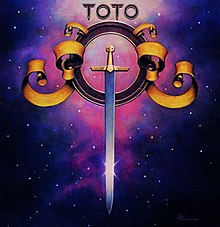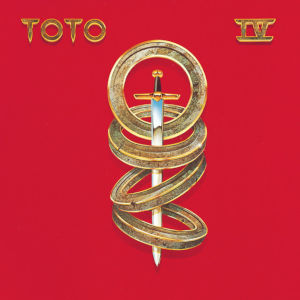
Toto IV is the fourth studio album by American rock band Toto, released on April 8, 1982 by Columbia Records.
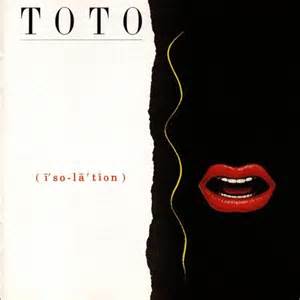
Isolation is the fifth studio album by American rock band Toto, released in November 1984. Isolation is the first album to feature longtime bassist Mike Porcaro and the only album with Fergie Frederiksen as the primary vocalist. Isolation failed to achieve the popularity of its predecessor, Toto IV, although it achieved gold record status and gave the band their highest charting mainstream rock single "Stranger in Town". Relatively few songs from this album were featured in live performances after 1985's Isolation World Tour.
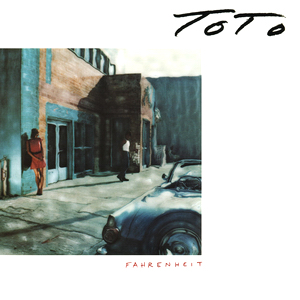
Fahrenheit is the sixth studio album by Toto, released in 1986. It was their first album to feature Joseph Williams on lead vocals. Former lead singer Fergie Frederiksen was fired due to problems with his ability in the studio. However, he sings backing vocals on the song "Could This Be Love". It was also the last Toto album until Toto XIV in 2015 to feature keyboardist Steve Porcaro as a permanent member, as he left after the Fahrenheit tour. The album failed to go gold until 1994, but featured two top forty singles in "I'll Be Over You" and "Without Your Love". "I'll Be Over You" featured Michael McDonald on backing vocals, who also made an appearance in the song's music video. Singer/dancer Paula Abdul appears in the video for the third single, "Till The End." The final song "Don't Stop Me Now" features Miles Davis on trumpet.

Turn Back is the third studio album by the American rock group Toto, released in 1981. Although it yielded the band's first top-ten hit in Japan and steady sales in that country, the album was a commercial disappointment elsewhere, failing to produce any charting singles and selling approximately 900,000 copies worldwide.

Hydra is the second studio album by American rock band Toto, released in 1979. It reached #37 on the Billboard Pop Albums. While most of the album's singles failed to make any impact in the charts, "99", a song inspired by the 1971 science fiction movie THX 1138, reached #26 on the Billboard Hot 100.

25th Anniversary: Live in Amsterdam is a live album by Toto, released in 2003, in the 25th anniversary of the band. And this was also the band's last live album to feature keyboardist/vocalist David Paich and bassist Mike Porcaro; Paich, before his semi-retirement from touring in 2005 until his return to the band in 2010 with Greg Phillinganes taking his place, and Porcaro, before his retirement from touring due to a ALS four years later and his death on March 15, 2015.

Other Roads is the tenth studio album by Boz Scaggs released in 1988. After an eight-year hiatus from recording, Scaggs returned in 1988 with this album, a record aimed primarily at the adult contemporary market.

The Seventh One is the seventh studio album by the American rock band Toto. It was released in 1988, and became the best-received Toto album since Toto IV. The title track, "The Seventh One", is featured only on the Japanese version of the album and on the B-side of the single "Pamela". It was also released on some compilations on a later date. It would be their second and last studio album with lead vocalist Joseph Williams until Toto XIV (2015).

"Hold the Line" is a song by American rock band Toto from their 1978 eponymous debut studio album. Written by the band's keyboardist David Paich, the lead vocals on the song were performed by Bobby Kimball.

"Rosanna" is a song written by David Paich and performed by the American rock band Toto, the opening track and the first single from their 1982 album Toto IV. This song won the Grammy Award for Record of the Year at the 1983 ceremony. "Rosanna" was also nominated for the Song of the Year award. It is regarded for the half-time shuffle which drummer Jeff Porcaro developed for the song. The groove has become an important staple of drum repertoire and is commonly known as the "Rosanna shuffle".
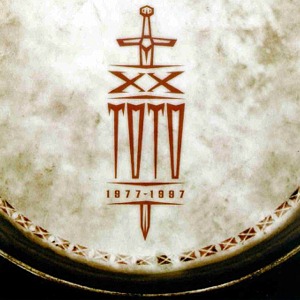
Toto XX: 1977–1997 is a compilation album by Toto to celebrate their 20th anniversary. The album features rare original demos, outtakes, previously unreleased recordings and live tracks from the band's 20-year career. Despite its being labeled as a compilation album, Steve Lukather in 2014 defined the album as the tenth studio album overall.

"Make Believe" is a song by the American rock band Toto, released as the second single from their triple platinum 1982 album Toto IV. It peaked at number 19 in Cash Box magazine and at number 30 on the Billboard Hot 100 chart on September 25, 1982. The song was also featured on the 2006 video game Grand Theft Auto: Vice City Stories on the radio station Emotion 98.3.

Vagabond Heart is the sixteenth studio album by British recording artist Rod Stewart, released on 25 March 1991 by Warner Bros. Records. The album reached No. 10 in the US, and reached No. 2 in the UK. The album features five singles, among them a cover of Robbie Robertson's song "Broken Arrow" and Van Morrison's song "Have I Told You Lately", which would become a hit two years later, and is Stewart's most recent top five solo hit in the US and the UK. The two biggest hits from the album were "Rhythm of My Heart" and "The Motown Song". The latter song features Steve Lukather, David Paich, Steve Porcaro and Jeff Porcaro.
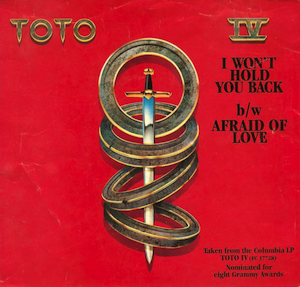
"I Won't Hold You Back" is a song by American rock band Toto, written and sung by Steve Lukather for their fourth album, Toto IV, released in 1982. The song features the Eagles' bass player Timothy B. Schmit on backing vocals during the choruses.

"I'll Supply the Love" is a song written by David Paich and recorded by Toto, with lead vocal's by Bobby Kimball. It was issued on Toto's debut album, Toto, and released as a single in January 1979. It peaked at number 45 on the U.S. Billboard Hot 100, where it spent nine weeks on the chart.
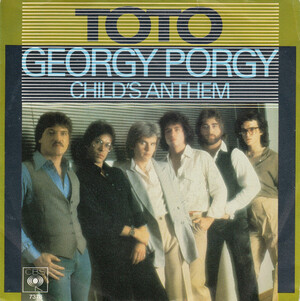
"Georgy Porgy" is a song by American rock band Toto. It was written by band member David Paich and included on their self-titled debut album in 1978. Released as the album's third single in 1979, the song reached number 11 on the New Zealand Singles Chart and number 48 on the US Billboard Hot 100. It also peaked at number 18 on Billboard's Hot R&B/Hip-Hop Songs chart.
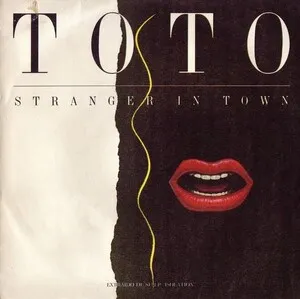
"Stranger in Town" is a hit song by American rock band Toto from their 1984 album Isolation.

Toto XIV is the thirteenth studio album by the American rock band Toto. Toto released the album on March 20, 2015. It is the band's first studio album since Falling in Between in 2006.

40 Trips Around the Sun is a greatest hits album by American rock band Toto, released on February 9, 2018. The album was released in commemoration of the 40th anniversary of Toto's self-titled debut album (1978).

Old Is New is the fourteenth and final studio album by American band TOTO. It was released as part of the band's All In box set on November 30, 2018, and separately on April 3, 2020. The tracks "Devil's Tower", "Spanish Sea" and "Oh Why" feature deceased band members Jeff and Mike Porcaro.
